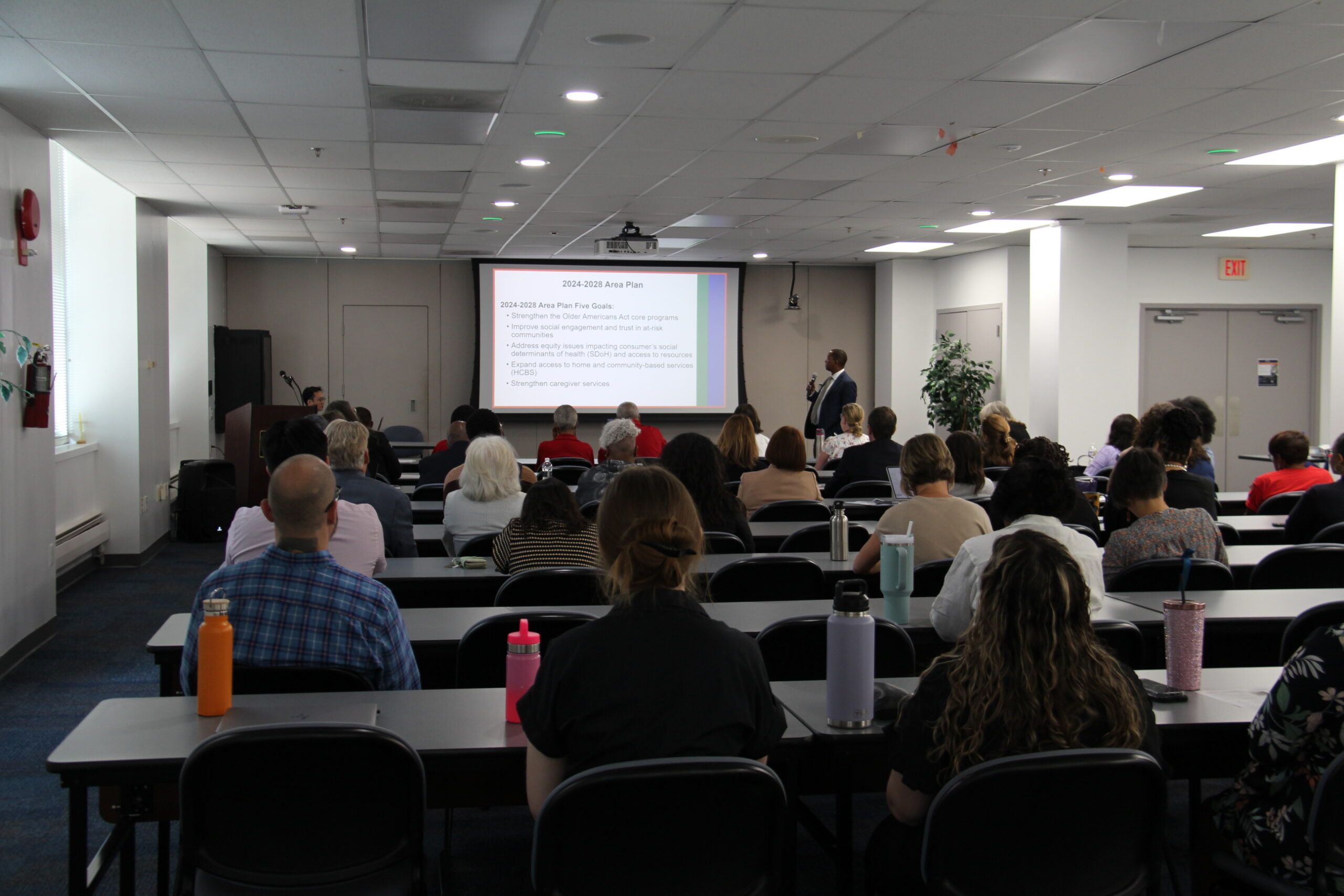Annual Public Hearing Summary of Testimony and Responses
Glenn D. Bryan, Philadelphia Corporation for Aging (PCA) board chair, welcomed everyone to PCA’s Annual Public Hearing. He began by highlighting some of the impactful work that PCA has accomplished in improving the quality of life for older Philadelphians, adults living with disabilities, and caregivers over the years. He thanked everyone for their contribution to PCA’s achievements and shared a hopeful message of resiliency for the future. To conclude, Mr. Bryan encouraged the audience to continue participating in the discussions that followed and thanked them for being in attendance.
Dr. Orr welcomed attendees to PCA’s Annual Public Hearing to discuss organizational updates, the proposed budget for the fiscal year 2025-2026, and plans to repurpose PCA’s Annex building into a new affordable senior housing community. He began with a demographic overview of older Philadelphians, followed by a list of programs and services through which PCA impacts the lives of older adults, adults living with disabilities, and caregivers. He emphasized the significant increase in the number of individuals served over the last four years, such as eligibility assessment, care management, transportation, and Older Adult Protective Services.
After discussing PCA’s programs and services, Dr. Orr shared important updates from both federal and state governments that have impacted or may impact the aging network and the agency. This included the restructuring of the Department of Health and Human Services (HHS), the draft of the President’s proposed fiscal year 2026 budget—which included cuts to several OAA programs, subsequent reversal of some of the proposed cuts, partially due to strong advocacy efforts, and proposed cuts to Medicaid and SNAP. He emphasized that while not all cuts may directly affect PCA and other Area Agencies on Aging (AAAs), they would significantly impact PCA’s constituents and the state budget upon which AAAs rely. He also discussed state updates, including the Governor’s budget proposal, which recommends a 20 million dollar increase in funding for the PENNCARE program compared to last year, the funding that provides key services to support older Pennsylvanians through AAAs; 3-million-dollar investment to modernize the PA Link as part of the Aging our Way, PA strategy; and 2 million dollars to fund an initiative aimed at strengthening the oversight and accountability of AAAs. He underscored PCA’s continued advocacy efforts on behalf of older Philadelphians and their caregivers in response to these federal and state changes and budget proposals.
Dr. Orr shared the agency’s plans for fiscal year 2026, including the 2024-2028 Area Plan and upcoming community listening plans. He highlighted PCA’s improvement and innovative efforts, such as the upgraded Helpline call center platform, which enables consumers to connect with PCA through multiple channels, the updated software for the Senior Center experience, and a HUD-funded pilot project for home modifications. For fiscal year 2026 financials, he presented projected revenue, which is yet to be confirmed by the state later in the year. He emphasized that approximately 80 percent of PCA funding comes from the state, while roughly 20 percent comes from the federal government. In presenting the fiscal year 26 projected expenses, he noted that PCA, like all AAAs, is mandated to allocate a minimum of 60 percent of its budget to Long-Term Care programming. This leaves 40 percent of the budget available for the remaining PCA programs and services. The next largest portion of projected expenses, amounting to 14 percent, is the Community Services category, which includes senior centers. To conclude his presentation, Dr. Orr thanked the audience and invited Laura Weinbaum, Chief Operating Officer, to speak on the Home@642 project.
Ms. Weinbaum began by framing the project within the context of housing affordability challenges faced by older Philadelphians, highlighting the opportunity PCA has to address this long-standing issue. PCA’s Annex building, which has been vacant for over 50 years, spans approximately 79,000 sq ft and has the space to be converted into a new, affordable senior community. In partnership with HumanGood, PCA proposes to renovate the building to create up to 70 quality, accessible units for residents aged 62 and older with consideration for an on-site senior community center. She presented the list of anticipated funding sources for the project and noted that it is currently in the preliminary phase, during which many aspects may change as it develops. She then opened the floor for testimonies.
Testimonies
Eric Ramos (comments read by Katie Young, Planning Manager)
Chief Executive Officer
Impact Total Fitness
Mr. Ramos’ testimony began by bringing attention to his dedicated team of instructors and the hundreds of older adult participants they have served for over 25 years. Impact Total Fitness delivers evidence-based fitness programs tailored to aging populations, including Enhance Fitness. This program improves strength, balance, flexibility, and cardiovascular health, among other benefits. As an instructor trainer, he highlighted his role as a trainer who builds the workforce with quality education, reaching communities through local senior centers and beyond. He noted that his over 25 years of experience in the field provided him with depth of knowledge, sustainability, trust, and leadership-level perspective.
Mr. Ramos then compared the current compensation rate to market values, noting that it impedes the ability of Impact Total Fitness to attract quality instructors, especially given that neighboring counties can offer higher rates. Mr. Ramos asked for consideration of a rate adjustment that aligns with the true cost of providing programming and supports their ability to hire qualified instructors. To conclude, he thanked PCA for its time and consideration.
Response:
PCA thanks Mr. Ramos for his testimony and steadfast dedication to helping older adults stay active, maintain well-being, and achieve an enhanced quality of life and values its partnership with Impact Total Fitness. PCA welcomes his feedback and will continue to evaluate our funding once it is determined to see if any adjustments can be made. While a decade of flat funding puts pressure on all programs and services, PCA continues to advocate at the State and Federal levels for more funding to support partners like Impact Total Fitness, which provides high-quality, essential programming to older adults.
Reneé Cunningham
Executive Director, Center in the Park
President, Board of Directors, PA Association of Senior Centers (PASC) Southeast Region
Member, Mayor’s Commission on Aging
Ms. Cunningham started by expressing her gratitude for the opportunity to provide testimony. She highlighted the ongoing budgeting challenges that will affect Fiscal Year 26, notably flat funding and the rising costs of delivering programs and services, along with new obstacles stemming from the changes at the federal level. She outlined several ways that federal funding rollbacks and instability have already impacted Center in the Park and its participants. For instance, sponsors and grantors have been withdrawing commitments and contracts.
Ms. Cunningham pointed to a number of line items from PCA’s projected revenue and expenses for the upcoming fiscal year; for example, while care management and personal care programs are expected to receive funding increases, senior community centers are projected to face a decrease in funding. She expressed concern and frustration regarding the proposed budget decrease, considering PCA’s close connection to senior centers and its efforts to engage participants in advocating for increased funding. In addition, she raised concerns about Home@642 plans that include a new senior center while anticipating reductions to the network.
She asked PCA to provide additional details about the proposed budget decrease with the senior center network. She thanked PCA for considering her testimony and looked forward to a further conversation.
Response:
PCA thanks Ms. Cunningham for her testimony and appreciates her and her team’s passion, commitment, and tireless efforts to help older Philadelphians age well in their community. The involvement of the participants of Center in the Park in PCA’s advocacy campaign showed the power of partnership synergy. PCA is grateful for the close working relationship and looks forward to our continued work together to achieve shared missions.
PCA values Ms. Cunningham’s frankness about budget challenges and shares her frustration over shifting funding sources. The draft budget depicting a decrease of funding to senior community centers, while preliminary, was a difficult one, as PCA is mandated to allocate a minimum of 60 percent of its budget to Long-Term Care services, which leaves less than 40 percent of the budget available for community services, access services, and administration. Funding levels for all service categories will be finalized once the federal and state budgets are finalized and allocations are awarded to the Commonwealth’s 52 Area Agencies on Aging. PCA recognizes the pivotal role of the senior community center network in helping Philadelphia’s older adults maintain their health, well-being, and independence. PCA leadership looks forward to continued discussions around the funding for senior community center services with Ms. Cunningham and remains committed to supporting grants or other funding streams to supplement their services.
PCA thanks Ms. Cunningham for her ongoing support and partnership. Center in the Park is a valuable resource for older Philadelphians, and PCA is always grateful for their tremendous work.
Q&A with Dr. Orr
PCA advisory council board chair Sandy McNally shared a few words with the audience, thanking them for attending and encouraging them to share their feedback on the presentation before turning the microphone over to Dr. Orr. He expressed gratitude to Ms. Cunningham and Mr. Ramos for their testimonies. Mr. Bryan continued the discussion by stating that PCA is a non-profit organization and emphasized the importance of everyone participating in discussions to diversify funding in this day and age. He added that he and the board are working to strategize the best way to do so. With those remarks, the hearing concluded.




